
THE CHINA MODEL
THE CHINA MODEL
Political Meritocracy and the Limits of Democracy
DANIEL A. BELL
Princeton University Press  Princeton and Oxford
Princeton and Oxford
Copyright 2015 by Princeton University Press
Published by Princeton University Press, 41 William Street,
Princeton, New Jersey 08540
In the United Kingdom: Princeton University Press, 6 Oxford Street,
Woodstock, Oxfordshire OX20 1TW
press.princeton.edu
Jacket photograph: A general view of the closing session of the
National Peoples Congress, at the Great Hall of the People on March 16, 2007.
Photograph Andrew Wong/Getty Images.
All Rights Reserved
Library of Congress Cataloging-in-Publication Data
Bell, Daniel (Daniel A.), 1964
The China model : political meritocracy and the
limits of democracy / Daniel A. Bell.
pages cm
Includes bibliographical references and index.
ISBN 978-0-691-16645-2 (hardback)
1. Political cultureChina. 2. Merit (Ethics)Political aspectsChina. 3. Political leadershipChina. 4. Elite (Social sciences)Political activityChina. 5. DemocracyChina. 6. ChinaPolitics and government19762002. 7. ChinaPolitics and government2002 I. Title.
JQ1516.B45 2015
306.20951dc232014044502
British Library Cataloging-in-Publication Data is available
This book has been composed in Electra LT Std
Printed on acid-free paper.
Printed in the United States of America
1 3 5 7 9 10 8 6 4 2
To my Chinese mother and father
CONTENTS
ACKNOWLEDGMENTS
I should confess that there is not a single original idea in this book, except perhaps for the way ideas have been put together. I have relied on the kindness of both strangers and intimates to think through these ideas, and the product is a communal work (though I need to take final responsibility for whats written on the page). If I were to thank everyone who generously gave of their time, Id have to add an additional page of notes on each page, thanking this or that person for nearly every idea in this book. Plus, I also need to confess that Ive forgotten most of who said what. So let me offer thanks here, though I need to doubly apologize for my memory lapses because Im sure Ive forgotten some people.
Early drafts of chapters were presented and discussed in lectures, seminars, and workshops. I am grateful for the feedback of colleagues and students at the following institutions: Tsinghua University, Peking University, Shandong University, Renmin University, Wuhan University, National Taiwan University, Wesleyan University, Kenyon College, Harvard University, Stanford University, State University of New York at Buffalo, National University of Singapore, Nanyang Technological University, Sungkyunkwan University, the Seoul Institute, the Nordic Institute of Asian Studies (Copenhagen), University of Iceland, University of Greenland, University of Duisberg-Essen, Universit de Montral, and McGill University, as well as Unirule (Beijing), Intelligence Squared debate (Hong Kong), and annual meetings of Ideacity (Toronto), the World Economic Forum (Davos and Dalian), the Institute for New Economic Thinking (Hong Kong), the Asan forum (Seoul), and the American Political Science Association (Washington, D.C.).
Special thanks to Tan Sor-hoon and Terry Nardin for organizing sabbatical leave at the University of Singapore that allowed me to work on this book in an intellectually stimulating environment (and with unrestricted access to the Internet!). I am also grateful for the support of colleagues and friends at Tsinghuas Department of Philosophy and Schwarzman Scholars program. For (in)valuable research assistance, I thank Jia Peitao, Liu Yuhan, Sun Simeng, Wang Binfan, Wei Ran, Yuan Jingyan, and Zeng Rui. For meticulous copyediting, I thank Madeleine Adams, and for efficient help with production, Natalie Baan.
I thank the following friends and colleagues for helpful discussions and/or for providing material helpful to my research: Joseph Adler, Roger Ames, David Anderson, Yuen Ang, Steve Angle, Anthony Appiah, Timothy Garton Ash, Julien S. Bell, Thomas Bernstein, Ben Richard Kelsey Blumson, Cai Xianhui, James Caldwell, Mark Cameron, Gilles Campagnolo, Cao Feng, Ivan Cardillo, Kateri Carmola, Jennie Chen, Chen Lai, Chung-Ying Cheng, Siyao Cheng, Valerie Cher Goh May, Ja Ian Chong, Chien-min Chou, Chu Yun-han, Chua Beng-huat, Jon Chua, Jean-Marc Coicaud, Margaret Conley, Sam Crane, Cui Zhiyuan, Fred Dallmayr, Jrgen Delman, John Delury, Avner de-Shalit, Bruce Dickson, Doh Chull Shin, Els Van Dongen, Wolfgang Drechsler, Du Lun, Duan Demin, Prasenjit Duara, Peter Edwards, Yiran Elenaz, Mark Elliott, Amitai Etzioni, James Fallows, Fan Ruiping, Fang Fenglei, Fang Zhaohui, Paolo Farah, Allan Fels, Ann Florini, Edward Friedman, Francis Fukuyama, Gan Chunsong, Gan Yang, N. Ganesan, Mobo Gao, Nathan Gardels, Farah Godrej, A. Tom Grunfeld, Linyu Gu, Werner Gundel, Seref Ulug Guner, Hahm Chaibong, Ken Hammond, Han Sang-jin, Dag Hareide, He Baogang, Geir Helgesen, Tze-ki Hon, Huang Jing, Huang Yusheng, Michael Ignatieff, Bruce Jacobs, Martin Jacques, Kanishka Jayasuriya, Sivanathan Jheevanesh, Jiang Haibo, Jiang Qing, Kang Xiaoguang, Peter Katzen-stein, John Keane, David Kelly, Parag Khanna, Sang-jun Kim, Sung-moon Kim, Leo Koguan, Kong Lindong, Kong Xinfeng, Chandran Kukathas, Kwa Chin Lum, Mean Luck Kwek, Martin Laflamme, Lee Chun-yi, Richard Levin, David Li Daokui, Li Qiang, Li Wanquan, Li Yong, Liang Zhiping, Chong Ming Lim, Teng Leng Lim, Liu Chunrong, Liu Kang, Liu Wei, Susanne Lohr, Simon Long, Lu Feng, Lu Keli, Du Lun, Steve Macedo, Kishore Mahbubani, Philippe Major, Ian Malcolm, Margali Menant, Thaddeus Metz, Donald Moon, So Young Moon, Christopher Mosch, Guido Muehlemann, David Mulroney, Ng Han Wei, Van Hiep Nguyen, Joseph Nye, Leanne Ogasawara, Lynette Ong, Evan Osnos, Jeremy Paltiel, Pan Wei, Pasquale Pasquino, Randy Peerenboom, Peng Guoxiang, Jane Perlez, Philip Pettit, Ora-orn Poocharoen, Ethan Putterman, Qian Jiwei, Qin Hui, Gideon Rachman, M. Ramesh, Marie-Eve Ren, Sidney Rittenberg, Daan Roggeveen, Philippe C. Schmitter, Mark Schwartz, Orville Shell, Sheng Hong, Geir Sigurdsson, Neil Sinhababu, Billy So, Dorothy Solinger, Jaeyoon Song, Song Min, Kristin Stapleton, Andrew Stark, Su Jun, Anna Sun, Sun Hsiao-Li Shirley, Sun Zhe, Charles Brian Suresh, Michael Szonyi, Kevin Y. L. Tan, Tan Sek-loong, Fred Teng, Carsten Boyer Thgersen, Tu Weiming, George E. Vaillant, Marius Vermaak, Michael Walzer, Wan Junren, Wang Hui, Juan Wang, Jun Wang, Kan Wang, Ken Wang, Wang Shaoguang, Wang Xuedian, Daniel Weinstock, Leif Wenar, Tang Wenming, Lynn White, Charles Wolf, Benjamin Wong, Reuben Wong, Wu Genyou, Wu Wanwei, Wu Yun, Xiao Geng, Hong Xiao, Xiao Wei, Xie Weihe, Xibai Xu, Alexander Yakobson, Yan Xuetong, David Yang, Yang Mu, Yang Ping, Yang Qianru, Yang Ruqin, Yang Xiao, Yao Xinzhong, George Yeo, Yvonne Ying, Yu Yongding, Yuan Yue, Zhang Feng, Lovis Zhang, Zhang Maoqi, Zhang Mei, Zhang Ming, Ning Zhang, Zhang Weiwei, Zhang Xudong, Zhang Yongle, Zheng Yongnian, and Qin Zhu. I should add that while Ive learned from the views of the people named here, some will vehemently disagree with the normative orientation of the book.
I am particularly grateful to friends and colleagues who generously gave of their time to write comments on earlier drafts of chapters: Bai Tongdong, Gerald Chan, Joseph Chan, Chen Ruoyu, Cheng Xiaoxu, John Dryzek, Benjamin Elman, milie Frenkiel, Jean-Yves Heurtebise, P. J. Ivanhoe, Liu Yuhan, Richard William Miller, Paik Wooyeal, Graham Parkes, Qiu Feng, Sun Haiyan, Sun Yan, Kenneth Paul Tan, Melissa Williams, and Elena Ziliotti.
Next page
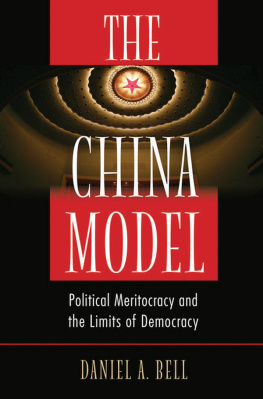
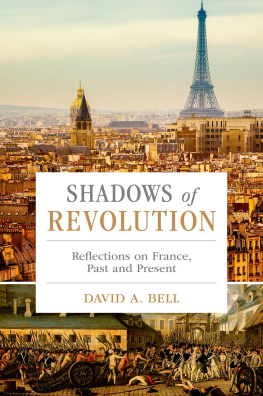
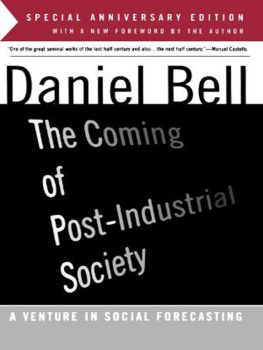
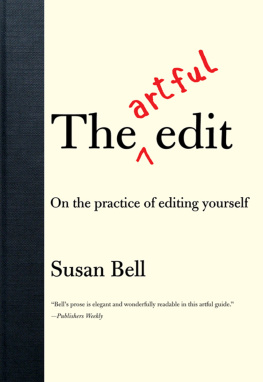
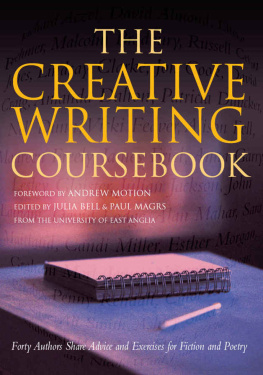


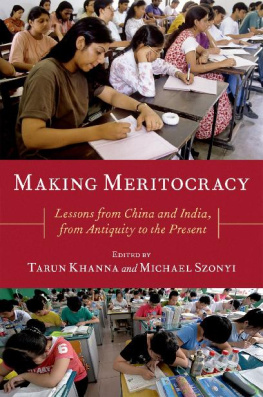
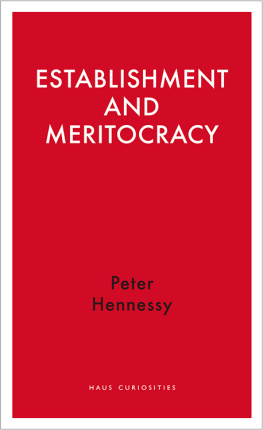
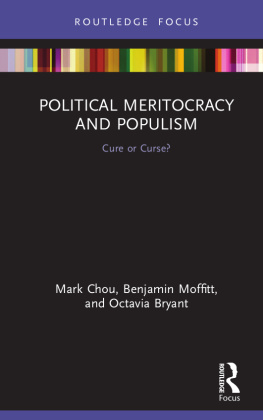
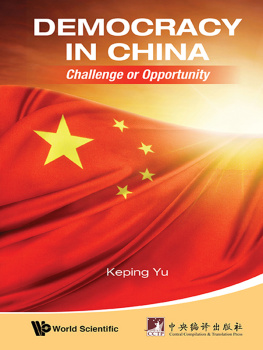
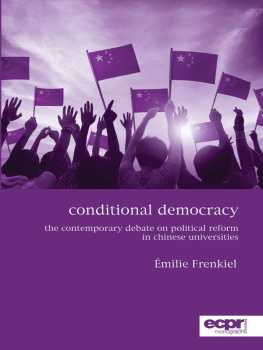
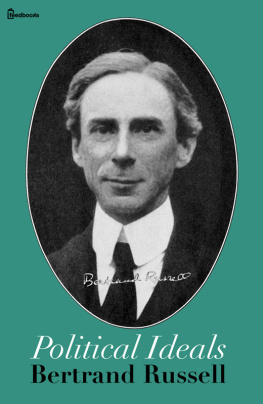
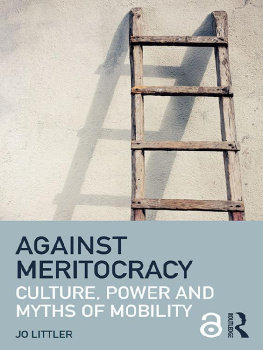

 Princeton and Oxford
Princeton and Oxford